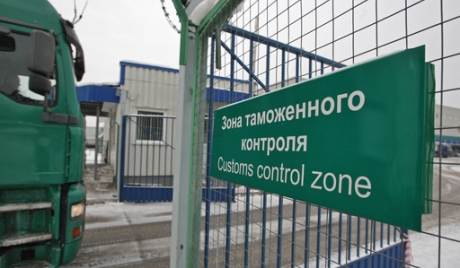
Opposition to Customs Union Grows Across Eurasia
Publication: Eurasia Daily Monitor Volume: 10 Issue: 117
By:

While the Customs Union between Russia, Belarus and Kazakhstan is seeking to expand its membership, paving the way for the gradual incorporation of the Kyrgyz Republic and Ukraine into its integration orbit, opposition in these countries to the Eurasian integration project has been steadily rising.
Several days after the meeting of the Supreme Eurasian Economic Council (a decision-making body of the Customs Union) in Astana on May 29, where the presidents of Kyrgyzstan and Ukraine had also been present, Kyiv and Bishkek signed memoranda on the deepening of cooperation with the Eurasian Economic Commission (a supranational governing body of the Customs Union), which will grant them the right to participate in selected meetings of the Supreme Council and the Commission (www.eurasiancommission.org/ru/nae/news/Pages/28-05-2013-3.aspx). While Kyrgyzstan had already filed an application to enter the Customs Union on June 8, 2009, Ukraine seeks the status of an observer, which, Kyiv believes, would allow it to move closer to the Customs Union without jeopardizing its membership in the World Trade Organization (WTO) or its relations with the European Union.
In a separate press briefing, concluding the meeting on May 29, the presidents of Kazakhstan and Ukraine both made statements that served as a caveat for their respective electorates that the integration within the Customs Union is based on purely economic drivers and does not foresee any political integration. “I want to note once again that there is no planned transfer of political functions to the supranational bodies that could weaken the state’s sovereignty,” Kazakhstan’s Nursultan Nazarbayev said. Ukrainian President Viktor Yanukovych noted that the decisions made during this meeting were reached via consensus and that this is an important principle of cooperation in the Customs Union (www.kazpravda.kz/c/1369860077/).
Kyiv’s signing of the memorandum with the Customs Union was immediately criticized by Ukraine’s domestic opposition, which even suggested that the parliament should legally restrict Ukraine from entering the Customs Union and other organizations that stand in the way of political and economic integration with the European Union (www.regnum.ru/news/1666609.html).
In Kazakhstan, meanwhile, attempts arose to challenge the authorities’ decision to have entered the Customs Union with Russia and Belarus in the first place. A group of activists convened on March 16, 2013, in Almaty, and proposed organizing a referendum that, as opposition leader Bulat Abilov summarized on his Facebook account, should decide on the “four most critical questions of the country’s life. These are: withdrawal from Customs Union membership, nationalization of the largest mining enterprises, elections of regional administrations at all levels and a ban on the construction of nuclear [power] stations.” The group had to collect not less than 200,000 of signatories to organize such a referendum (www.newskaz.ru/society/20130316/4884649.html).
However, on April 3, one of the opposition activists, Mukhtar Taizhan, announced that their meeting had not reached a quorum, which is required by law to submit a claim to the official authorities and start activities on organizing a referendum. Failure to organize a referendum is generally attributed to institutional weaknesses of the opposition in Kazakhstan, which is currently disorganized and fragmented. But the authorities might have also suppressed the attempt, as Taizhan claimed. Another stumbling block for the opposition may be that the Customs Union and Kazakhstan’s Eurasian vector as such usually tend to find more support among the country’s younger generation, while the older and more conservative elites prefer to sustain the links with Russia.
The issue of Kazakhstan’s Customs Union membership has become so politicized because it engages a broad spectrum of stakeholders. Kazakhstani business circles have doubts and fears as well. The vice president of the Independent Association of Entrepreneurs, Timur Nazkhanov, said that the Russian market still maintains non-tariff barriers in place for products from Kazakhstan. Acknowledging that a process of withdrawal from the Customs Union would be difficult to fulfill, Nazkhanov said that business will continue to hope that the government will stand up for its interests (Kapital.kz, March 26).
The move against the Customs Union is supported by two of the most outspoken proponents of rising Kazakh nationalism: Mukhtar Taizhan and Aidos Sarym. Taizhan, in an interview on May 14 to the Kyrgyz newspaper Vecherny Bishkek, warned that Kyrgyzstan should not enter the Customs Union. Eurasian integration is an unequal process, he argued, because of Moscow’s political domination, Russia’s economic superiority, as well as the non-participatory approach to the decision on entering the Customs Union (Vecherny Bishkek, May 14). Whereas, Sarym—a political scientist and opposition activist—noted in an interview titled “Kazakh Question and Kazakh Answer” that Russia lost its exclusive cultural attractiveness and has no other strong lure for Kazakhs. Sarym insisted that there is a demand and a search for a nation-based ideology for Kazakhstan, and many in society are trying to capture what “the Kazakh idea” might be like (Central Asia Monitor, May 17).
Partly in response to such claims and fears, State Secretary of State Marat Tazhin gave a speech on June 5 and appealed to the country’s historians to reform their methods and meet current challenges and demands for a less confrontationally grounded ideology. As noted by Tazhin, the history of Turkic-Slavic interaction, in particular, should not be presented in a negative way as “this is a history of a more complex trade, political, military and cultural links and positive aspects should not be omitted” (www.kazpravda.kz/c/1370472643 ).
It is unlikely that the opposition in Kazakhstan is yet capable of adroitly utilizing institutional tools to their advantage or of consolidating business grievances and rising Kazakh nationalism into one political platform. However, it is becoming evident that some Kazakhstani politicians, like their more experienced colleagues in Ukraine, are increasingly challenging the current regime with a new anti-Eurasianist message.




